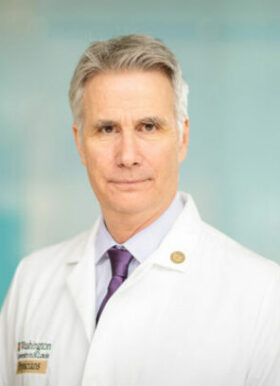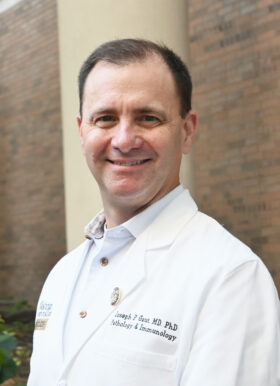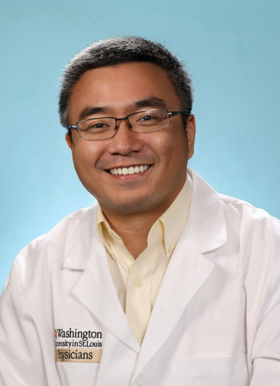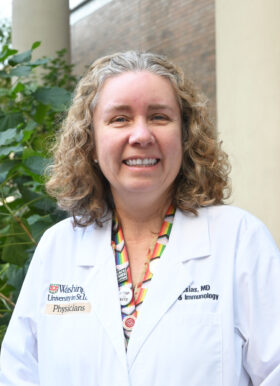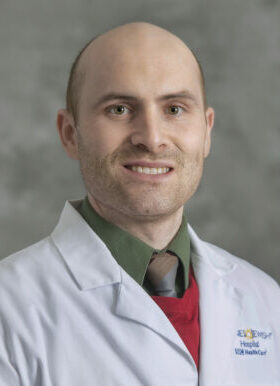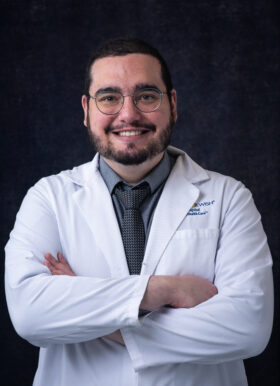
Genitourinary and Renal Pathology Fellowship
Overview
The Division of Anatomic and Molecular Pathology at WashU Medicine, St. Louis, Missouri will train one combined genitourinary and renal pathology fellow per year. The fellowship is unique among few that follow a hybrid model, allowing for formation of pathologists with two areas of subspecialty: genitourinary and medical renal pathology. Our department has a subspecialty practice model, and fellows will be under the guidance of faculty from specialized genitourinary and renal pathologists. In addition to the Pathology faculty, the fellows will work in close interaction with the faculty and fellows from the Division of Urologic Surgery in the Department of Surgery and the Division of Nephrology in the John T. Milliken Department of Medicine.
Program Details
The fellowship will expose the trainees to a truly integrated practice of renal and GU pathology through the course of the year. Genitourinary pathology sign-out will be concentrated in the mornings and renal pathology in the afternoons.
On genitourinary pathology, the fellow reviews biopsy and routine in-house cases and on consults sharing this workload with a resident under his supervision. Our large number of cases ensures that a breadth of cases will be seen, from a large spectrum of common diseases to the rarest entities. Clinical activities include pre-dictating cases, coordinating ancillary testing, and communicating preliminary diagnoses to clinical staff as needed. The fellow will have the opportunity to participate in several educational activities and present monthly.
On medical renal pathology, the fellow reviews all in house cases and inside/outside consults, including transplant and native kidney biopsies. We review light microscopy, special stains, immunofluorescence and electron microscopy within 24 hours of the biopsy, allowing for expedited complete review of the case, in all its aspects. All cases are seen in conjunction with the attending at a multi-headed scope. The fellow will be able to review all the ancillary tests and write the report, as well as interact with our outstanding nephrology team at Washington University School of Medicine.
Dedicated elective time (at least 4 weeks) for research and QA projects is designed into the course. Fellows in this program complete a QI/QA project. Our fellows routinely undertake research projects, resulting in scientific publications. The department will support travel to present at a national meeting. Frozen section experience is also included in the program.
In addition to the selective areas of renal and genitourinary pathology, our department offers a multitude of lectures and didactics for all of our trainees, and the fellows in our combined genitourinary and renal pathology fellowship are allowed and encouraged to participate.
The selective (surgical) pathology fellowship at WashU Medicine is recognized as one of the oldest, largest and most successful programs of its kind. In 2018, the Department of Pathology & Immunology completed a transition to a fully subspecialized sign-out model. Under the leadership of Eric J. Huang, MD, PhD, named department head in 2025, the department is embracing new technologies in transition to the digital pathology age. The combined genitourinary and renal fellowship received initial accreditation by the ACGME in 2024.
Applicants must have a MD or DO degree (or foreign equivalent with ECFMG certification) and 3 to 4 years of training in anatomic or anatomic and clinical pathology in an ACGME accredited program. Fellows must be board-certified or board-eligible in anatomic or anatomic and clinical pathology. Applicants must be legally authorized to work in the United States. J1 visa applicants are welcomed to the program.
This is a single-site fellowship that occurs in state-of-the-art facilities at WashU Medicine and Barnes-Jewish Hospital. The section of surgical pathology is located in the 680,000-square-foot BJC Institute of Health (BJCIH) on the WashU Medicine campus. This centrally located, 11-story building houses both clinical and research laboratories. The gross room has 28 grossing bays and is staffed by a team of nine pathologist assistants. The department uses voice recognition software, Copath lab information system, Epic electronic medical record and has a tradition of excellence in clinical informatics, including use of live-mode telepathology and whole-slide imaging.
Several multiheaded scope rooms are available for use, which greatly enhance the teaching/learning experience. Our electron microscopy facilities are second to none, equipped with high quality digital cameras for the preparation of images for clinical diagnosis. Electron microscopy images are usually available within 12-24 hours of biopsy accessioning, allowing for shorter than average turnaround time for renal biopsy sign out.

Transform Your Passion into Expertise
Applications for the 2027-2028 and 2028-2029 academic years are open. Interviews and offers will take place on a rolling basis until the position is filled.
Contact us if you have any questions.
Program Director:
Nidia Messias, MD
WashU Medicine
Pathology & Immunology
660 S Euclid Avenue
St. Louis, MO 63110
m.nidia@wustl.edu
Program Contact:
Kim Green
Senior Fellowship Program Coordinator
Phone: 314-747-8159
greenkd@wustl.edu
Faculty and Trainees
Let’s Connect
Your questions and feedback are the keystones of our continuous improvement. Whether you’re seeking more information about our services, need assistance from our experts, or want to share your experience, we’re here to listen and respond.
